If you haven’t seen Amazon’s smash hit GOOD OMENS, you don’t know what you’re missing! Excellence on every level from writing and directing, to impeccable production design and costuming, to flawless casting, to music and score. After all, how can you not love a show that has a vintage car driven by a demon walking the Earth among mortals and every time he gets in the car it plays Queen’s “Bohemian Rhapsody”!! Now picture David Tennant as that demon. Then add in his (although he won’t admit it) best friend, Aziraphale, an archangel from heaven very genteelly portrayed by Michael Sheen. Then let them wander the Earth for 6,000 years as the clock counts down to Armageddon and the Almighty’s “ineffable” plan. But after 6,000 years, Crowley and Aziraphale have come to love Earth and the lives it has given them, spanning the centuries with change and growth, fun and frolic, and of course, mischief. They don’t want to see the world end. And that leaves them with only one solution. Team up to save it.
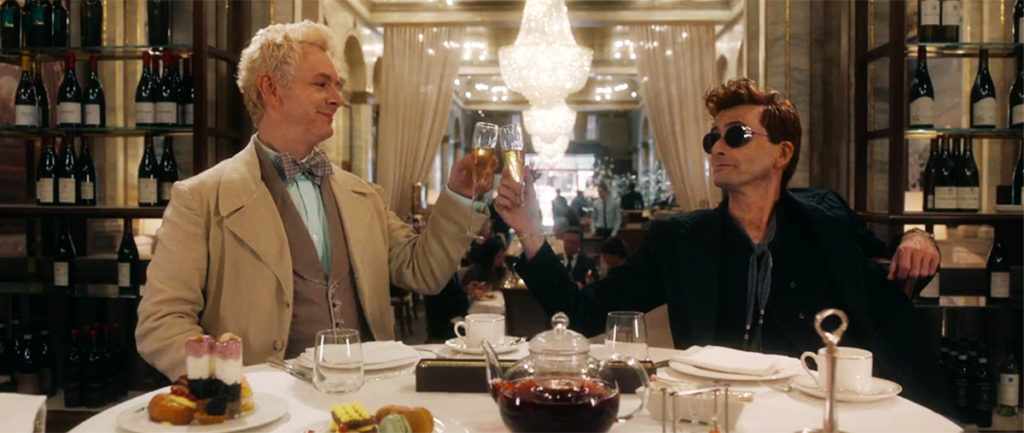
Based on the best-selling novel GOOD OMENS by Terry Pratchett and Neil Gaiman, Gaiman adapted the novel into the six-episode series, all of which are directed by Doug McKinnon. While the series rises and falls on the friendship between Aziraphale and Crowley, and the chemistry between Sheen and Tennant, production design and costume gives us visual touchstones through the ages while DAVID ARNOLD’s score serves as the thread tying all together. And what a beautiful thread it is. Nabbing two Emmy nominations for his work in GOOD OMENS, one for Outstanding Original Main Title Theme Music and the other for Outstanding Music Composition for a Limited Series, Movie, or Special (Original Dramatic Score), one listen to the title theme is all it takes to know why.
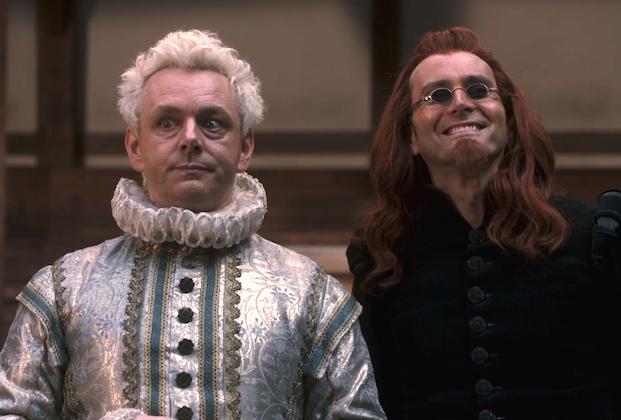
Already known for his scores in films like “The Stepford Wives” (2004), “Shaft” (2000), “Last of the Dogmen”, “Independence Day”, “Made in Dagenham”, not to mention five James Bond films (more than any other composer), and television series like “Little Britain”, “Come Fly With Me”, “Jekyll and Hyde”, and “Sherlock”, the latter for which he picked up an Emmy award for Best Original Dramatic Score, with GOOD OMENS, DAVID ARNOLD ventures into new musical territory, taking us on a journey through time as he finds a musical or sonic tone for each era from creation to pending Armageddon. Along the way, he melds score with needle drops and infuses ambient sound, allowing the music to develop in its structure and instrumentation as the world does. And Arnold doesn’t hesitate to provide aural nods as sensory touchstones to mirror the visual. A fun example is the “Ineffable Plan” theme which pays homage to the “High Noon” moment of a spaghetti western and Ennio Morricone’s well-known music. Another theme, “Crucified”, is an adagio featuring strings while notes of “We’re Doomed” are eerie and screechy with an apocalyptic feel. “Ansaphone” is pure whimsy akin to Mancini’s “Baby Elephant Walk”. And of course, “Hellbound” bodes tones of Queen and Brian May guitar licks. Each musical theme perfectly captures the story and emotion of each moment it supports. Needless to say, when one covers 6,000 years, themes are sprawling, but there is always a commonality that allows the music to serve as the connective tissue. And at the heart of the musical themes is the friendship and personalities of Aziraphale and Crowley which truly comes to life in the Emmy-nominated main title which is light, whimsical, and mischievous, but with prophetic beauty.
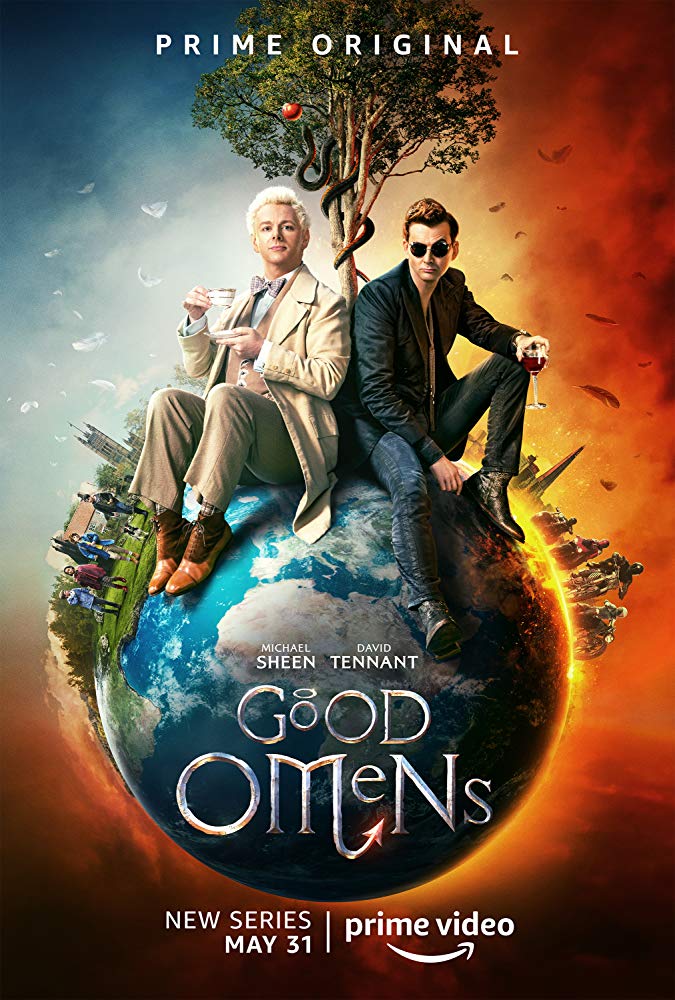
I spoke with DAVID ARNOLD at length about composing for GOOD OMENS and the freedom he found in order to create something he has never has done before for this “very unique show and a very unique experience”, to find the truth within the story and the music, and to bring a little bit of Queen to this world.
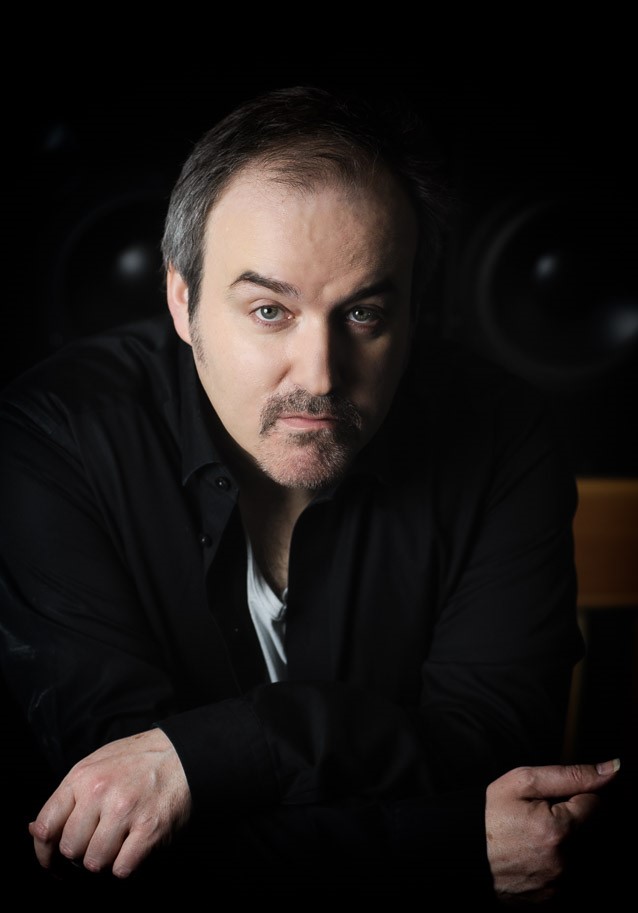
Congratulations, David! Two Emmy nominations!
Yes, yes. It’s better than one and better than none. And I’ve had none more than I’ve had one or two. So yeah, I’m very grateful.
To borrow from the show itself, when I think of your work with GOOD OMENS, I think “ineffable.” There are no words. This score for this series is spectacular! I am so in love with it. And I hate to say it, and Brian Tyler may shoot me for this, but as much as I love his beautiful thematic, dramatic score for “Yellowstone”, for me, nothing compares to what you have done with GOOD OMENS. It’s fun. It’s whimsical, it’s mischievous. It fits the two title characters and the respective actors so perfectly.
They’re fabulous. Everybody’s fabulous. And listen, I won’t tell Brian if you won’t. We don’t want his quiff to wilt. [laughing] We have a good time, we all do.
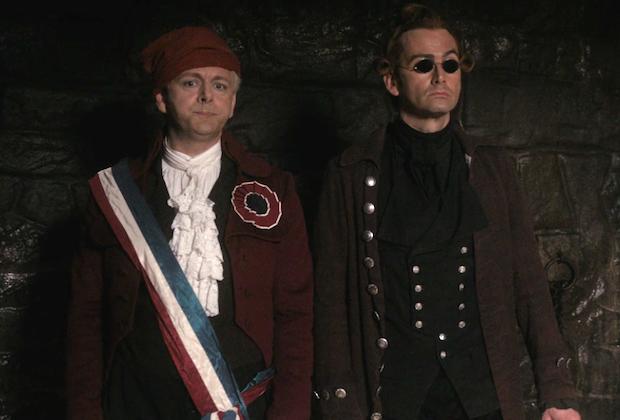
What you have done here, David, is unlike anything you’ve done before. I’m so familiar with your scoring. “Stepford Wives” may be the closest thing to GOOD OMENS, but “Independence Day” is very heavy, dramatic. And then there’s Bond.
There’s a touch of wickedness about the “Stepford Wives”, but I think the reason why you haven’t heard anything like this before is because I’ve never done anything like this before. I didn’t even know I could do something like this until I sat down in front of it. I think there was an element of Britishness about and I suppose what feels, whenever you think about TV on this scale and in a way it felt more like a six-hour film than a six-part mini-series, is that you kind of associate this scale of production and sort of optimism and ambition with American productions just because they tend to have the scale and the money and the vision for those sort of things. So to have a kind of British thing which was unashamedly British and set in a very sort of British humored place, but was about the world in a way that I didn’t say was necessarily possible, it was a gift in as much as it would be about something that felt like something real, as surreal as it was. And as you know, you can call it fantasy, you can call it fiction, but I think, it’s cool. It was about very real human things and it took some inhuman things to make us believe in those human things. That felt like it was the truth of it and the heart of it. So once you understand what a thing is saying, then the method which it says it becomes less important. What’s important is what you’re saying. So to have it kind of, sort of delivered to you in this glorious, unexpected, brilliantly performed piece was one of the gifts. I have to say is it might be the hardest I’ve ever worked on anything. It was a long time and a lot of notes and a lot of thinking and a lot of styles. But every day I sat down and I thought, “You know what? I know what I’m doing today. I know what to do with this show. I know what to do with this moment and I’m happy to be here with it.” And I just keep saying, I wish everything was like this. I wish everything was this gorgeous an experience. You really felt like you were in the hands of people who really cared; the producers supported it, the studios and the BBC supported it in as much that they didn’t get in the way of it. They literally sort of ushered it through and enabled it to happen and encouraged everyone to carry on doing what they thought was best for it. And it’s so unusual for that to happen.
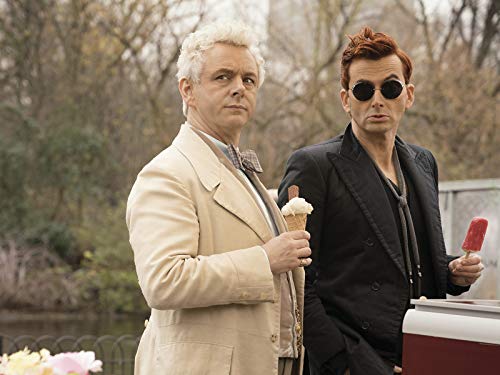
Something that I so love as I watch every episode and then re-listen to every thematic note in here is your use of instrumentation which is so critical. I listened to pieces like “The Globe”; very medieval flare. I hear lutes and lyres. Then I’ll listen to something like “The Four Horsemen” and you’ve got very bass brass and drums. Or “Bookshop On Fire”; it’s very slow, heavy, dramatic, and we’ll get a snare drum, we’ll get the brass sound, we’ll get harps in there. And each of these instrumentations connotates such specific imagery and emotion, but more than that, it’s very period, each is very period-perfect to its development at that point in the history of the world. And I just love that.
Yes! Well, it’s a matter of being honest with what’s in front of you. It’s not a particularly new idea to write stylistically for the scene that’s in front of you, but what we have in this story is that there is a through story and that when we go back in history, back in time, that the people who we are with at the beginning of the world and the same people that we with at the end of the world. So, even though it reminds me of the, the shot in the time machine, you know, the H.G. Wells’ Time Machine when he starts moving forward in time and you see the shop opposite him and the dummies as he goes through the seasons, like the clothes on the mannequins in the window change. It felt like that. It’s like these people are the same people at the beginning as they are at the end. It doesn’t change, they are them. I know one’s an angel and one’s a demon, but they’re still them, and what we were doing was kind of clothing the show appropriately for where they were in the world. Now, in terms of production design, obviously, if you’re building a sort of Roman palace or Shakespeare’s Globe, then you know there is reference for that. The idea of Shakespeare’s Globe design-wise has no bearing on what happens in the rest of the show. But what we say with music at every point in the show has some bearing on it. So, not only does it have to feel like it belongs in that world, but it still has to be part of the overall storytelling arc.
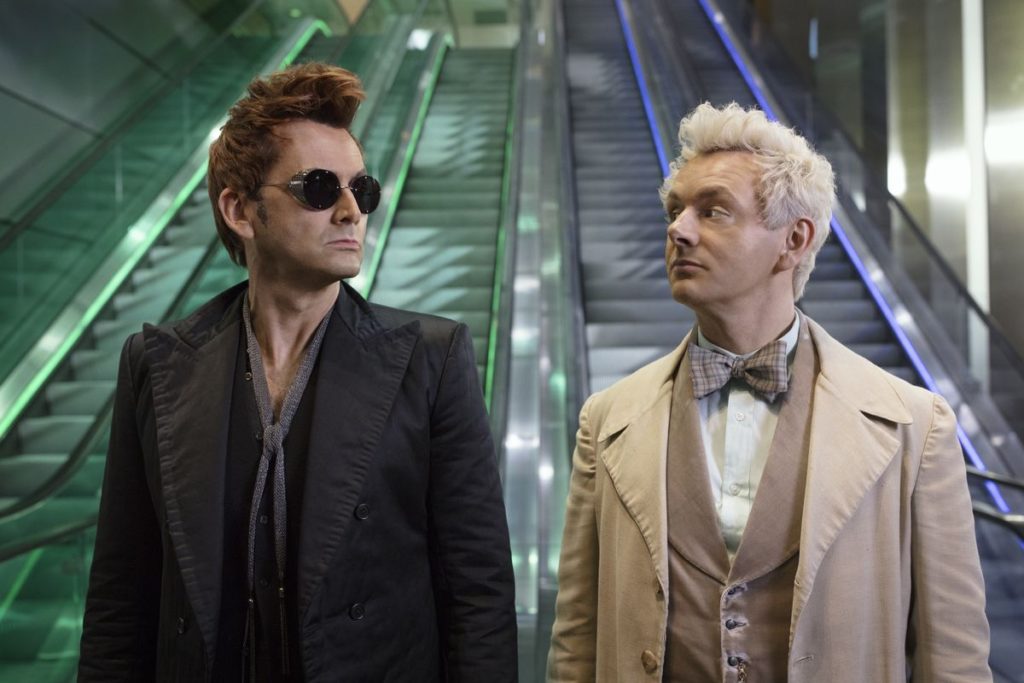
I looked at it like this is just another chapter in the story. But it’s the same story. You could make a film about those guys at any point and have a great movie. Aziraphale and Crowley in Shakespearean England. Aziraphale and Crowley during the Arthurian legend, during the Roman Empire, during World War II. Each of these would make a film. You could have a film about the Witchfinder. You could have a film about the Four Horsemen of the Apocalypse. But they just all happen to be in this one show. So coherency is prime and that comes down to having a sort of central musical sort of support network, like the skeleton. The theme is like the skeleton upon which all the rest of the muscles and the sinew and the hair and the clothing can rely on to grow. So that’s why there’s quite a lot thematic work in it because playing the scenes in slightly different styles is a way of grounding it in the storytelling. And again, this isn’t groundbreaking. It’s been done plenty of times before but I don’t think I’ve ever had one where it’s been quite as varied and quite as demanding stylistically. There was a point when, not on a compositional perspective, but there’s one tiny moment where I was asked could I make a piece of, sort of almost Gregorian plainsong morph into “We Will Rock You.” Those kinds of asks are normal for GOOD OMENS but they would be very not normal in any other world. So it was varied and demanding, but the answers always felt very clear at hand. And, luckily Neil Gaiman and Douglas MacKinnon were encouraging in their sort of wish for me to reach as far as I could and to go as far as I could. It literally was like having cheerleaders. You think you couldn’t go any further and then they said, “Go on. You can.” A very unique show and a very unique experience. And I like the fact that it has a beginning and middle and an end. You don’t feel it’s desperate for a second series or anything. It tells the story of the book, I think, completely.
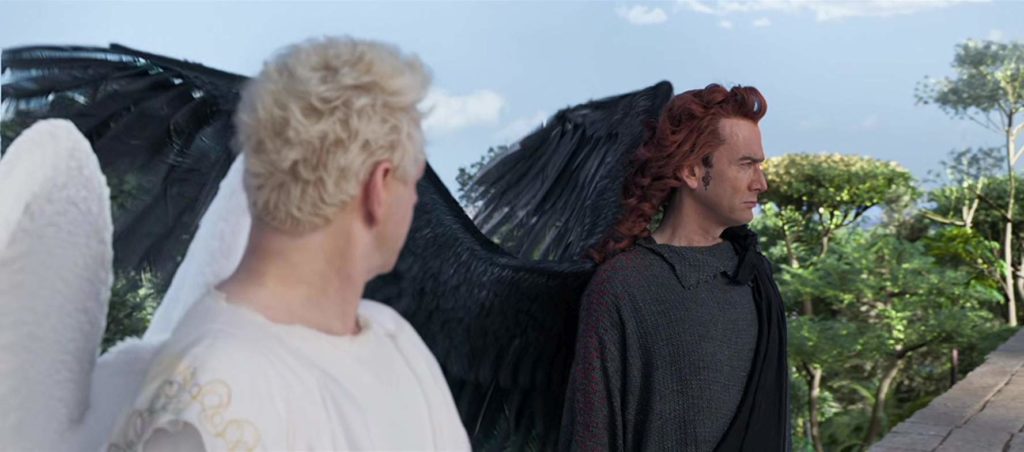
You mentioned “We Will Rock You” and from the opening of the series, Queen, “Bohemian Rhapsody”, is such a presence. Those musical notes! Brian May’s guitar infiltrates from beginning to end in here. And I’m in love with it. I think it’s fabulous the way you’ve integrated that, especially where we get into something like the theme “Hellbound.” You’ve got some Brian May, Queen guitar there, an organ, cymbals, but we start and we end with “Bohemian Rhapsody”, with Crowley. How much influence was Queen’s work on your design here and in integrating that?
Well, it was in the book and the idea of Queen being the gag. It was a tiny gag in the actual book. The gag was that whenever you leave a CD or cassette in your car for too long, it eventually turns into “Queen’s Greatest Hits.” So that turned into, whenever Crowley’s in the car Queen is playing no matter what is put in the CD player. So I knew that that was going to be a sort of part of the show for that reason. And the advantage that I had was that I was, I would say, partially obsessed with Queen from the age of about 12 to about 15. I already had my Brian May guitars and the amps, and I’ve been cleaning out an old, some old storage units over there and I found all the seven-inch singles that I had when they came out and the sheet music to the records and the albums. And I went to see them, I don’t know how many times, dozens of times. So I knew the tone and their approach to things quite intimately. So not only were there moments, obviously where you would hear the song, but there were also a couple of moments in the score where I would adopt kind of Queen production. I’d put the Queen production hat on and, normally I would do this with choir or orchestra or flutes or something, but say, “Why don’t I do it with Brian’s guitar? Why don’t I bleed into the real world the sound that is in Crowley’s car to help pull it all together?” And also, tiny little fragments of ideas that turned up in the score which were microscopic things from very old Queen records that I loved, things that were the spirit of it. And Queen is sort of grandiose, aren’t they? They have a sense of scale and it’s no secret or surprise that the stuff that they play works so well in stadiums because it all appeals on a sort of mass scale, which was a very difficult thing to do well and especially just sustain it over 40 years. So I was really happy that it was a part of the language of the show because I already felt I’d learnt it when I was little.
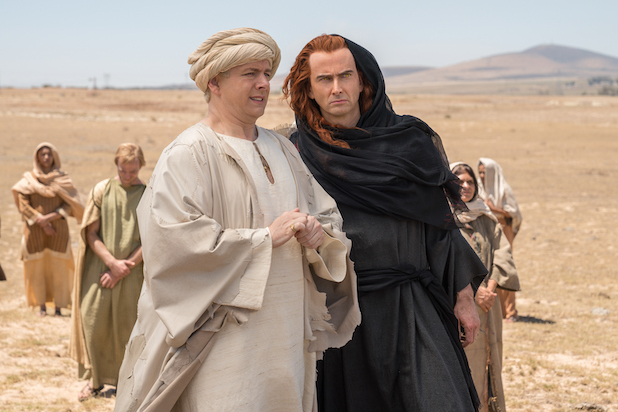
It just filled me with joy to hear it and then to pick up on those little touches that you infused into the composition and then in the orchestration and instrumentality. I was just so in love with that because just like GOOD OMENS, Queen is essentially the alpha and omega of rock. They’re the beginning and the end.
Yeah. You know, when I went to see them I was a little surprised that the audience [had] Had Hell’s Angels and old age pensioners and children in the audience, and oddly enough there was something for everyone. Now variety doesn’t always mean good. But you know, Queen seems to appeal to an awful lot of people for a lot of different reasons. And in a way, part of the idea of the show is possession. It’s like there’s something in you that you don’t think is there. The Antichrist is the son of Satan but he doesn’t really believe or think that he is, and without spoiling anything, the thing that Crowley and Aziraphale do at the end of the show. Also, the very first thing I ever wrote was the lullaby the demon has to sing to the Antichrist to make him go to sleep. I had a discussion with Neil Gaiman about it and I was saying that, “I love the idea of those sort of Mary Poppins, you know, Disney lullabies, they’re always so sweet.” So I wanted like “Baby Mine” or “Go To Sleep” from Mary Poppins. Those songs are so beautiful and we so associate them with lovely, beautiful things. And I thought, what about if this lullaby is basically if Walt Disney was possessed by Satan; what would that be like? So that’s where that idea came from. And I think this idea of other influences and leaching into bits and pieces of it so it all feels like it has the same home, the idea of identity and who we are and who you’re meant to be, is a big part of the show so there’s a lot of complicated elements. And it lends itself so well to this sort of analytical musical approach there’s so much to deal with and work with.
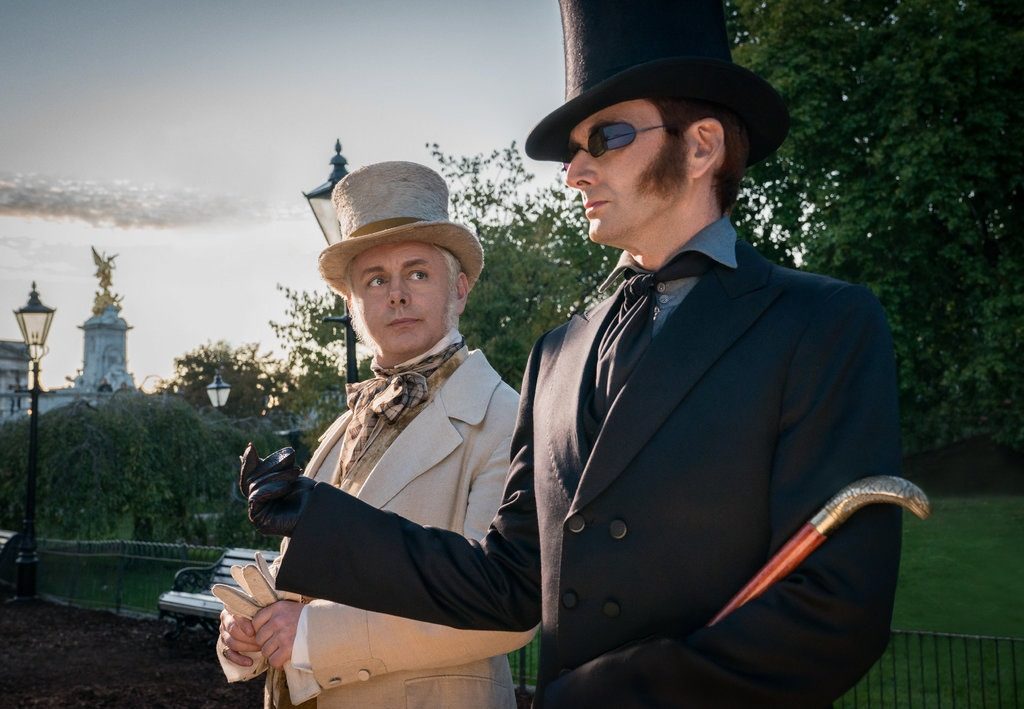
You also make great use of chorus and chorale throughout the series. For you as a composer, how challenging is that in incorporating that judiciously and aiding in the thematic, the emotional beats and thematics?
I think that choir is often overused. It becomes a thing that goes on when orchestra is playing full power when you need to go bigger. Sometimes it can be a bit of a cliche, but for me, singing is the most important musical art form, I think. It’s what we all do and did. The first sound that we ever make is singing. Whether you like it or not, crying and speaking is a kind of [singing]. Speaking is monotonous singing. We certainly sang before we spoke. And in terms of it being a form of communication, there’s nothing more direct. When you hear someone playing a solo violin, the beauty of it is you often hear people say it’s like listening to a human voice. And when you are listening to human voice then that goes directly to the core of who we are. I knew that I always wanted a choir to be a part of it. Either way, it has a sort of job as a commentary; like it’s a Greek chorus. It’s kind of musically commenting on what’s going on as well as being a part of the music. Also, it does stuff that you wouldn’t expect. You have the screaming or moaning or crying or chanting and each of these things, it evokes a sense of “hold on, that’s someone doing that”. Then that’s either good or bad that they are. It’s a great sort of shortcut to an emotional message to deliver to someone and then when you play something and you do something beautiful with a choir, when you’ve done something painful, or odd or unusual or unsettling before, then the power of that moment, of it being honest and beautiful is much more intense due to the contrast. So they were put to good use, our choir, and responded magnificently.
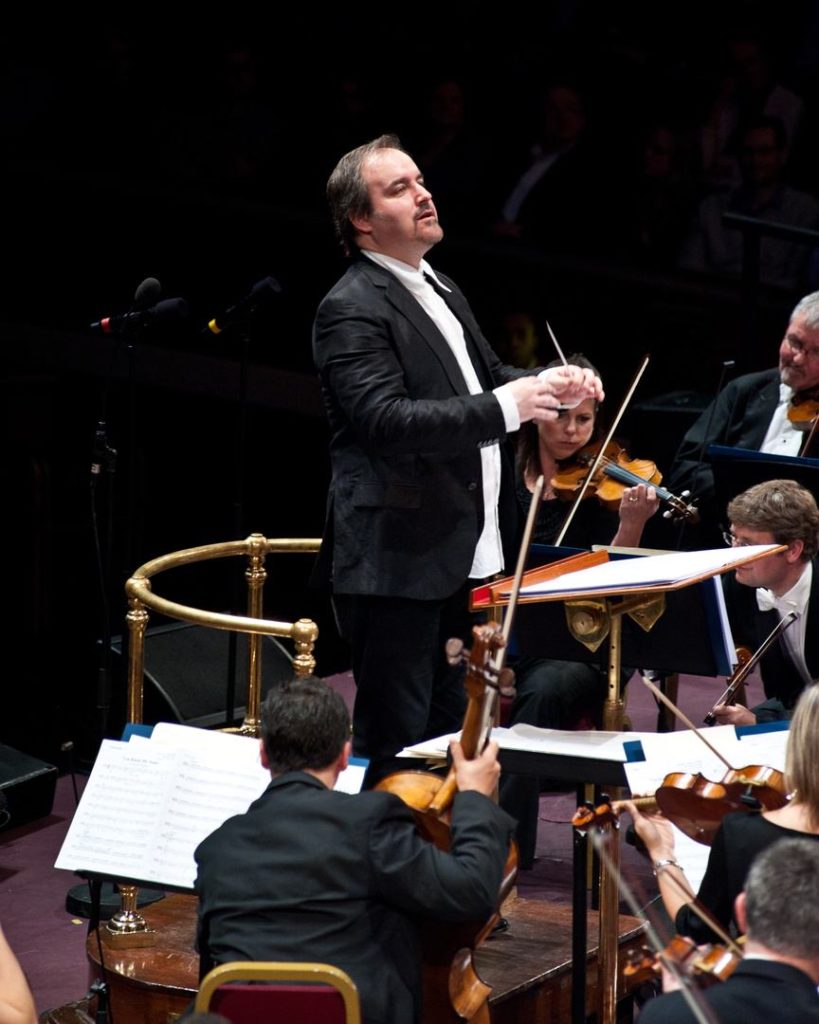
Now at the end of this process, now that you have done something you have not done before, what did you learn about yourself as a composer that you can now take forward into your future works?
Well, I’ve already done it because I’m doing I think my third thing since GOOD OMENS. And it has sort of changed the way I’ve thought about [composing] for a reason that I wasn’t necessarily expecting. I think when you’ve done films for like wherever it is, 20 years, 25 years and you’ve done a lot of different things, you still have a little bit of an idea that you know it all, that you think you know most of what it is that goes on. But it was a very great lesson learned here and, and in a way, I found out it was actually nothing to do with me, but everything to do with my collaborators. I felt 100% trusted. I felt 100% that these people allowed me to express what I felt about what they’d done in their show and therefore change it and be a part of the DNA of it. And no one said, “I don’t want you to do it like that” or no one said, “I want you to do it like this.” They all said, “Whatever you honestly feel and respond to is what we’re interested in and that’s why we’ve hired you.” And that is so rare for someone not to play you a temp track or send you a bunch of music and say “We’re thinking of this sort of thing.” There really wasn’t anything that felt like it was the music for GOOD OMENS until we wrote the music for GOOD OMENS. It was just one of these very strange things. And I think in the process of doing that I realized how much more creative I felt, how much more I’m enjoying the process, how un-nervous I was about experimenting and playing and things that otherwise you’re not. But the biggest thing was not having to second guess what anyone else was thinking; not having to worry about what an executive in a studio who I’d never met might have an opinion on, or that certain people in production might like things or might not like things, so you start tailoring the thing to suit a hundred different people, which if that’s what you’re doing and the sort of show that you’re going into, it’s fine. And I’ve done it plenty of times and I don’t mind, but the kind of unshackling of your creativity by being trusted is a huge thing. I feel like that’s all I want to do now. I don’t want anyone to kind of funnel me somewhere and say “I want you to do this thing which already exists.” It’s like the dream. The dream is “Here’s our idea. We want to hear yours. And we want to hear what you’ve got to say about it.” I’ve always written with the idea of knowing what I’m doing. I know why I do things the way that I do them and I’m able to explain that to people. And if people don’t like it, then that’s fine as well because I don’t like everything. There’s plenty of things I don’t like, but I always appreciate when people give me a challenge to at least do it and present it. So I think being trusted is everything and the more you think about it, the more you think, well that’s true of almost everything in your life. So something to aspire to is, I think, meet and work with people who you trust and who trust you.
by debbie elias, exclusive interview 08/13/2019












